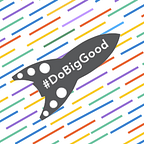This is not (only) our Black Lives Matter statement.
It’s our ongoing response that matters, both my response as a white founder and Do Big Good’s response as an organization.
Over the last several days, I’ve struggled to find the right words to respond to this crisis. But it’s not this public statement that matters. It’s what comes after. It’s our ongoing response that matters, both my own response as a white founder and Do Big Good’s response as a mostly white organization. Below is only the beginning of my reflections and commitments to make Do Big Good a more effective anti-racist organization.
First and foremost, I mourn the deaths of George Floyd, Charleena Lyles, David McAtee, and the many other BIPOC (Black/Indigenous People of Color) murdered in the name of white supremacy since our country’s founding. As a speaker at Wednesday’s protest here in Seattle said, “There are too many names.” These are the most recent casualties of white supremacy in a country founded on the enslavement of Black people and genocide of Native people. When forced to choose between white supremacy and human life, the state protected white supremacy.
There is no doubt that a dramatic redesign is needed to achieve a country that truly serves all its people. There is no doubt that this redesign must center BIPOC to achieve its transformational potential. We at Do Big Good commit ourselves to this work as researchers, activists, strategists, social workers, data scientists, designers, and media-makers.
But talk is cheap. It’s time for action. Here are the specific actions Do Big Good will take because Black Lives Matter and active anti-racism is necessary:
- Center and promote BIPOC individuals in our organization by developing an approach to a more equitable and effective anti-racist culture within the next three (3) months. I as founder commit to prioritizing this work and engaging the appropriate expert and peer resources by working with a bi-weekly white leaders’ accountability group, among others.
- Listen to, learn from, and amplify BIPOC leaders and organizations working in impact measurement, participatory design, and social justice consulting, such as Equitable Evaluation Initiative, Creative Reaction Lab, AdAstra Collective, and Pamela J. Oakes.
- Increase the visibility of BIPOC experts in our field by ensuring that any panel we participate in or convene has at least 50% BIPOC as speakers.
- Create and transfer financial opportunities to BIPOC-led organizations and consultants through partnership and referral. For every project we seek or are offered, we will ask, “Is there a BIPOC organization or individual who should be doing this work?” We will then work to engage those individuals or organizations as paid partners or transfer the project to them entirely.
- Financially compensate co-designers on all projects. The core of Do Big Good’s work is participatory design, co-creating impact measurement systems with frontline social change workers. While in the past we’ve asked clients to compensate these individuals, who are often BIPOC, we will now make it a requirement for all projects. These participants will be compensated at an hourly rate comparable to (and never less than) members of our own team, in recognition of the value of their insights.
- Credit co-designers on all projects. Likewise, we’ll credit co-designers by name in all reports and project deliverables, except in cases where those individuals have requested anonymity. We will continue to follow experts in design justice, like Sasha Costanza-Chock and the Design Justice Network, as we make ourselves more effective agents of racial justice in design work.
- Actively build new institutions. Do Big Good will seek out projects in which we use our participatory design and data analysis skills to build new anti-racist and equitable programs when we can confirm those services are needed and requested by BIPOC. We commit to doing at least one (1) such project in the next six (6) months.
Finally, I commit to constantly adapt and update these commitments. I commit to listening to my team, my peers, experts, and elders in realizing this adaptation. I commit myself to building a more actively anti-racist Do Big Good. I commit Do Big Good to building a just, equitable, and sustainable world.
by Mer Joyce (she/her), founder and principal of Do Big Good
Do Big Good is an impact measurement firm. We use participatory design to give mission-driven organizations the information they need to manage and maximize impact.
